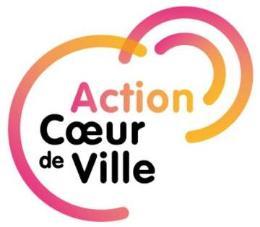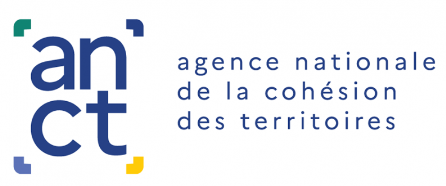National programme : « Action cœur de ville »
Restoring the appeal and dynamism of medium-sized town centres
April 2024
Agence nationale de la cohésion des territoires (ANCT)
Medium-sized towns are home to almost a quarter of France’s population and play an essential role in the regions. Some are showing signs of devitalisation, while others are booming. The government has decided to commit €5 billion over 5 years (2018-2022) to reaffirm the role of medium-sized towns and their town centres in tomorrow’s regional landscape.
Objectives

The national « Action cœur de ville » plan has a dual aim: to improve living conditions for the inhabitants of medium-sized towns and to reinforce the role of these towns as the driving force behind regional development.
Signs of this essential structuring role: 23% of the French population live in medium-sized towns, and 26% of total employment in France is concentrated there. These towns are a source of economic, heritage, cultural and social dynamism, but they sometimes experience difficulties in terms of attractiveness, run-down housing or commercial vitality, for example.
Developed in consultation with local elected representatives and economic players, the Action cœur de ville plan aims to facilitate and support the work of local authorities, encourage housing and urban development players to reinvest in town centres, and encourage businesses to remain in or move into town centres in order to improve living conditions in medium-sized towns.
Action cœur de ville 2 focuses on 4 main priorities:
-
Helping towns to meet the challenge of ecological transition;
-
Strengthen the service base, employment pool and central role of medium-sized towns throughout their territory;
-
Revitalising town centres as a priority in order to (re)bring people and activities together in a welcoming, pleasant and inclusive environment;
-
Accelerate the operational implementation of actions, by providing towns with the support they need to implement more complex cross-cutting projects and appropriate funding.
A local project
Built around a local project, the regeneration initiatives are part of partnership financing agreements. These involve both the local authority and its intercommunal body, as well as the public and private partners in the plan, and focus on five key areas to enhance the attractiveness of medium-sized towns:
-
refurbishment and restructuring of town centre housing ;
-
balanced economic and commercial development
-
accessibility, mobility and connections
-
enhancement of public spaces and heritage; and
-
access to public facilities and services.
« Action cœur de ville » is therefore based on a series of measures designed to help municipalities and inter-municipal bodies to mobilise the expertise and resources they need for their projects, in particular by simplifying and facilitating their procedures.
5 billion over 5 years
Through this plan, the State is playing a facilitating role to enable local and regional authorities to develop their own projects. To achieve this, €5 billion has been mobilised nationally over five years with various funding partners.
Local and national governance
Action cœur de ville is a programme with national ambitions that requires a high level of interministerial involvement, in addition to that of the funding partners.
The Ministry of Territorial Cohesion and Relations with Local and Regional Authorities, which initiated the programme, is also steering its legislative development, while the other ministries are contributing their expertise in the various areas: the Ministry of the Economy and Finance, the Ministry of Ecological Transition and Solidarity, the Ministry of Higher Education, the Ministry of Labour and the Ministry of Culture.
The plan is being implemented not only in conjunction with local and regional authorities, but also by bringing together public and private players at both national and local level on a decentralised and devolved basis:
-
the mayor, in conjunction with the president of the inter-communal body, steers the implementation of the actions and manages the urban project;
-
the prefect gathers expressions of interest, coordinates services and mobilises State resources. He leads the local partnership;
-
the regional public and private partners take concrete action in the defined areas by making new investments and/or stepping up their involvement.
The role of ANCT
ANCT is involved in coordinating and running the programme. A dedicated team has been set up and is structured around its programme director, Dominique CONSILLE.
Every fortnight, she convenes the partnership steering committee, whose purpose is to decide on the programme’s main guidelines and intervention framework.
Target areas - 244 medium-sized towns
The programme concerns 244 towns or pairs of towns selected on 26 March 2018, on the proposal of the Minister for Territorial Cohesion, by the national steering committee.
Medium-sized towns, which play a central role within regions, have not really been the focus of public policies targeted at revitalisation issues in recent decades, and their town centres in particular. Yet some of these towns have the characteristics of neglected or devitalized areas, where specific public action is needed and, more generally, to combat territorial fractures. Others, although in less difficulty, need to be supported in their central role.
Scope for action
An area of intervention in the town centre is defined collectively for the implementation of revitalisation actions. By integrating the town centre and the inter-municipal area to which it belongs, it makes it possible to identify the interactions (complementarities, competition, fractures, etc.) between certain functions in the heart of the conurbation and the rest of the catchment area, in order to envisage the rebalancing and reinforcement that may be required to revitalise the heart of the conurbation.
Since the launch of Action coeur de ville 2, priority has been given to station areas and town entrances.
Actions at station entrances will aim to diversify uses, redevelop spaces and even renaturalise them, with a view to reducing the use of land and decarbonising transport, via a coherent policy for the conurbation as a whole.
The actions carried out in the station areas, meanwhile, will pursue the objectives of encouraging land-saving and reducing the artificialization of land, improving architectural, urban and landscape quality, anticipating changes in the commercial sector and consumption patterns, and demonstrating the potential for recycling town entrances.
Services on offer
Action cœur de ville is a programme aimed at local authorities. The range of services on offer is structured around the needs expressed by local authorities in several phases:
-
signature of the Action cœur de ville framework agreement ;
-
Initiation phase lasting between one and eighteen months, with a full diagnosis and the implementation of actions ready to be launched in accordance with the 5 areas of work;
-
Approval of the Action cœur de ville agreement as an ORT agreement.
Deployment of actions
The Action cœur de ville programme provides for measures to revitalise town centres for each target audience: for local authorities and intercommunal bodies; for businesses and economic and service activities; for town centre owners and tenants; for property developers and landlords; and for residents and visitors.
In addition, Action cœur de ville provides local authorities with the opportunity to benefit from ongoing enrichment through a number of partnerships, including with the Cnam (Conservatoire national des arts et métiers), SIAGI and Val’hor.
Partners
With Action cœur de ville, more than 7,000 projects have already been identified and €6 billion of the €5 billion initially earmarked for the 2018-2022 period has been committed up to the end of 2022. The second phase of the Action coeur de ville programme will benefit from an additional commitment of €7 billion from Caisse des Dépôts, Action logement and Agence nationale de l’habitat.
In addition to providing financial support, Caisse des Dépôts is also backing innovative initiatives, guaranteeing the creation of landholding companies dedicated to commerce and economic activity, offering support schemes for social housing and a host of other tools.
Action logement , one of the services it offers, provides funding for revitalisation through the construction, renovation and demolition of housing and buildings, and fights against the territorial divide and the return of employees to the heart of medium-sized towns.
The Agence nationale de l’habitat provides expertise in the area of old town centres (helping private owners and co-ownerships with renovation work, helping local authorities and operators to create a new housing supply by recycling unfit buildings) via schemes such as OPAH-RU and provides half of the funding for local authority project managers.
Numerous institutional partners are also supporting the Action cœur de ville programme, including Puca, the Cité de l’architecture et du patrimoine, Cerema, CNFTP and Anru.
And others: Ademe, CCI France, Assemblée permanente des chambres de métiers, etc.
